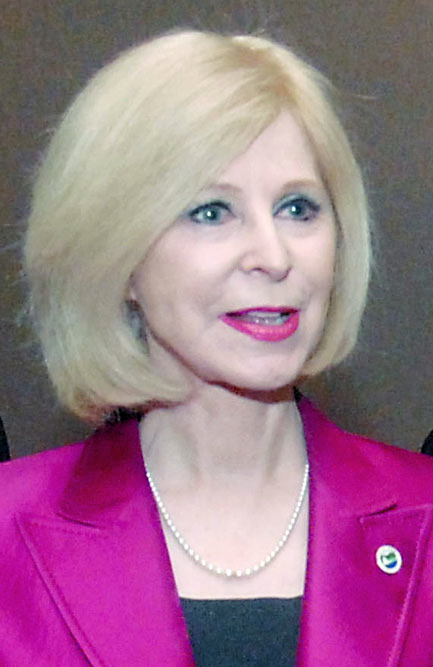PORT ANGELES — A courtroom-like ethics board hearing Tuesday on Marolee Smith’s four-part complaint against Deputy Mayor Cherie Kidd ended with the panel on the verge of making a decision.
The three-hour meeting in City Council chambers at City Hall attended by about two dozen residents was followed by the panel meeting behind closed doors for about 2½ hours of deliberations on the complaint.
When board members Frank Prince Jr., Grant Meiner and Danetta Rutten emerged, they scheduled a public meeting at 9 a.m. Friday at City Hall, 321 E. Fifth St., to announce a decision, City Clerk Jennifer Veneklasen said late Tuesday afternoon.
Prince said after the closed-door session that he, Meiner and Rutten will vote Friday on each part of the complaint and will explain the reasoning behind their decisions.
At the outset of Friday’s meeting, “I will explain to everyone how we approached the complaint and its supporting material,” Prince said.
Smith, an unsuccessful 2015 City Council candidate, takes Kidd to task for the deputy mayor’s role in banning signs in council chambers during a Feb. 2 meeting and abruptly adjourning the meeting during heated public comments over water fluoridation.
Tuesday’s meeting included sworn testimony. Prince tightly controlled the meeting, at one point admonishing an audience member for laughing out loud when Kidd said she adjourned the meeting because it became so raucous that “the safety of the public was in question.”
The panel took sworn testimony from Kidd, Smith and four witnesses — Dan Bateham, Mike Libera and Robert Flood on Smith’s behalf, and Laura O’Neal on Kidd’s behalf.
Smith has accused Kidd of violating Paragraph J of the city code of ethical conduct that relates to the role of elected officials.
It targets Kidd’s handling of the meeting, at which political signs were banned, and by adjourning the meeting in the middle of Flood’s comments during a public comment section.
Paragraph J reads as follows:
“Public officials shall conduct themselves toward the public in a civil and professional manner that will foster public respect and cooperation.
“Public officials shall refrain from abusive conduct, personal chargers, and verbal attacks upon the character or motives of other public officials, staff, or the public.
“Public officials shall not use language or engage in acts that demean, harass, or intimidate another person.
“Public officials shall not engage in any conduct or activities that reflect discredit on the public officials, tend to bring the city into disrepute, or impair its efficient and effective operation.”
Smith referred in her complaint to the sign ban as Kidd’s “dictatorial edict.”
Kidd also was degrading and hostile to the audience, Smith said.
“I don’t believe a lone City Council member is able to make up rules as they go along,” Smith told the panel Tuesday.
In her review of parliamentary procedure, Smith told the board, “Nowhere could I find that a motion to adjourn would be required by a council member screeching out, ‘This meeting is adjourned.’ ”
But she said the council is “technically correct” that the City Council can determine its own rules of order.
During testimony, Prince, who commented the most among board members, stressed the importance of taking public comment at council meetings and the nature of the issues he, Rutten and Meiner were dealing with.
“Decorum is a terribly subjective topic,” Prince said.
He suggested that Flood’s comments were a pivotal moment in the Feb. 2 meeting.
Kidd adjourned the meeting after cutting Flood short with seven more speakers to go.
Speakers were allotted three minutes each.
Flood, an opponent of fluoridation, compared pro-fluoridation council members Kidd, Mayor Patrick Downie and Councilmen Dan Gase and Brad Collins to “The Four Horsemen,” citing famine, pestilence, death and destruction.
Flood said they rode “with ignorance and stubborn demeanor” before Kidd called Flood out of order — about a minute before his time was up — for making “personal insults” she called “inappropriate.”
O’Neal and Kidd said the audience grew increasingly restless as the meeting wore on.
Audience members booed and shouted out their displeasure at the proceedings.
“In Robert’s Rules of Order, it says in an unstable environment and if it’s very disruptive, it’s up to the chair to adjourn,” Kidd said Tuesday.
“There was no longer a safe environment.
“There was no longer decorum in there by all the laws of parliamentary procedure.”
She said the citizens’ behavior, which she said included ad hominem and personal attacks, had created “a safety issue.”
Kidd also said signage can be banned in council chambers, which constitute a “limited public forum” under the law, unlike, for example a public sidewalk.
“We have never had such a deluge of signage in council chambers” as the council has experienced in recent meetings, Kidd said, adding she discussed the issue with City Attorney Bill Bloor.
“I did not make an arbitrary decision at all.”
The abundant signage, propagated by fluoridation opponents, had become distracting, Kidd said.
“We did not have a history of signage being represented on that scale,” she said.
Bateham, who ran against Kidd in 2015, said Kidd was disrespectful to speakers and interrupted them during public comment.
“Stifling free speech was not fostering public respect or cooperation between the City Council and citizens,” he said.
Kidd said she could not easily read the clock that had been in council chambers and that a new digital clock makes it easier to time speakers.
She said she interrupted speakers about 15 seconds before their three minutes were up as a courtesy to allow them to sum up their thoughts.
“It was not to be discourteous but to be extra courteous,” Kidd said.
________
Senior Staff Writer Paul Gottlieb can be reached at 360-452-2345, ext. 55650, or at pgottlieb@peninsuladailynews.com.

